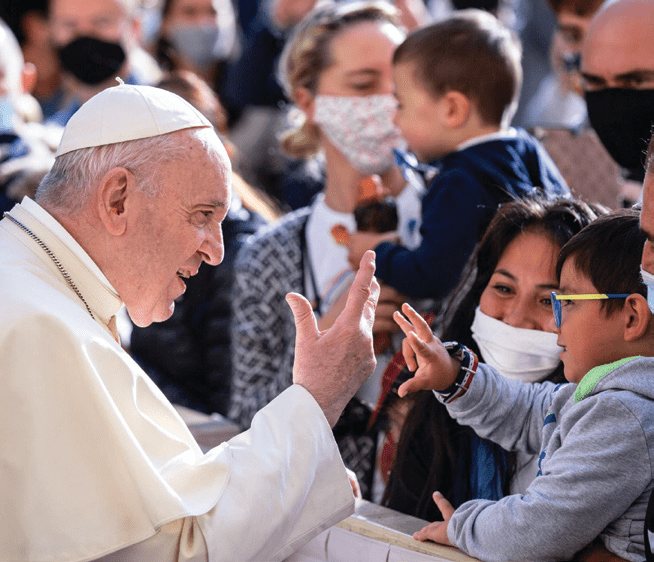Last August 16, 2022, Paolo Ruffini, the Prefect of the Vatican’s Dicastery for Communication, addressed the World Congress of the Catholic network SIGNIS, an international association for Catholic professionals in the field of communication, in Seoul (South Korea), recalling the challenge of good journalism: to be creative and promote communication that focuses on dialogue, intelligence and helping build active communities. This year, the annual event focused on the theme “Peace in the Digital World.” The Prefect of the Dicastery for Communication pointed at the paradox of our time, that we are hyperconnected yet lonely: there is no longer communication, but only technological connection. He called for a personal and collective examination: “How is it possible to be simultaneously hyper-connected and terribly alone? What is missing from our connection that can bridge this loneliness, and that is strong enough to endure over time?” Or why is it that we are hyperconnected, but we are so divided?
Instead of being frustrated with this paradox of modern means of communication, Ruffini affirmed that the only way for us to respond to the challenge of technology is “not to think of it as an idol, but also not demonize it, not to believe that it has the task of redeeming humanity, but also, not think that its perdition depends on it.” He recalled how Pope Francis responded to a girl during a meeting with young people at the Solmoe Shrine during his visit to South Korea in 2014. The pope had stressed that “happiness cannot be bought.” “Whenever you buy happiness,” the Pontiff had added, “you soon realize that it has vanished… The happiness you buy does not last. Only the happiness of love is the kind that lasts.” “Consumerism,” Paolo Ruffini went on to say, “confuses short-term satisfaction for more profound and more lasting happiness. “We know that we are not just consumers, let alone objects to be consumed. We know very well that only a relationship – a connection based on love – can make us less lonely, can last, and make us happy.” “And love,” noted the Prefect of the Dicastery for Communication, “is based on this supreme fragility, which is the need for love; to love and to be loved; to give and to give oneself. Here is the root of all communication. Appealing to all Catholic communicators, journalists, and all men and women of goodwill engaged in the difficult and great field of communication, the Vatican prefect said: “We can be protagonists of a new humanism, embodied in active and participatory communities. We can weave together a new idea of citizenship.”

One urgent challenge that we in media must address is the phenomenon of migrants and refugees. For this, we wish to highlight the message of Pope Francis for the 108th World Day of Migrants and Refugees on September 25, 2022, with the theme Building the Future with Migrants and Refugees. The pope stressed that no one must be excluded. God’s plan is essentially inclusive and gives priority to those living on the existential margins. Among them are many migrants and refugees, displaced persons, and victims of trafficking. The Kingdom of God is to be built with them, for without them, it would not be the Kingdom that God wants. The inclusion of those most vulnerable is the necessary condition for full citizenship in God’s Kingdom. Indeed, the Lord says, “Come, you who are blessed by my Father. Inherit the Kingdom prepared for you from the foundation of the world. For I was hungry, and you gave me food, I was thirsty, and you gave me something to drink, a stranger and you welcomed me, naked and you clothed me, sick and you took care of me, in prison and you visited me.” (Mt 25:34-36)
Building the future with migrants and refugees also means recognizing and valuing how much each of them can contribute to the process of construction. The pope used the prophet Isaiah’s vision which considers foreigners not as invaders or destroyers, but as willing laborers who rebuild the walls of the new Jerusalem (cf. Is 60:10-11). He noted how history teaches us about the fundamental contribution of migrants and refugees to the social and economic growth of our societies. Their contribution could be all the greater were it optimized and supported by carefully developed programs and initiatives. Enormous potential exists, ready to be harnessed, if only it is given a chance.
The pope added that in Isaiah’s prophecy, the inhabitants of the new Jerusalem always keep the gates of the city wide open, so that foreigners may come in, bringing their gifts: “Your gates shall always be open; day and night, they shall not be shut, so that nations shall bring you their wealth.” (Is 60:11) The presence of migrants and refugees represents a great challenge, but at the same time, an immense opportunity for the cultural and spiritual growth of everyone. According to Pope Francis, we must thank migrants, for with them, we have the chance to know better our world and its beautiful diversity. With them, we can grow in our common humanity and build together an ever-greater sense of togetherness, well-being, happiness, and peace.




